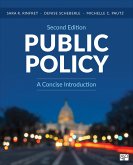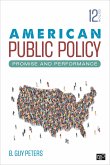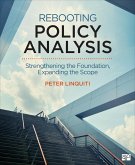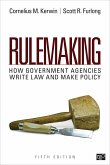Mary Manjikian (Regent University, Virginia, USA)
Introduction to Cyber Politics and Policy
Schade – dieser Artikel ist leider ausverkauft. Sobald wir wissen, ob und wann der Artikel wieder verfügbar ist, informieren wir Sie an dieser Stelle.
Mary Manjikian (Regent University, Virginia, USA)
Introduction to Cyber Politics and Policy
- Broschiertes Buch
- Merkliste
- Auf die Merkliste
- Bewerten Bewerten
- Teilen
- Produkt teilen
- Produkterinnerung
- Produkterinnerung
Introduction to Cyber Politics and Policy is a comprehensive introductory textbook for cyber politics and security courses that bridges the gaps between the intricacies of technology and the theories of political science.
Andere Kunden interessierten sich auch für
![Public Policy Public Policy]() Sara R. R. Rinfret (Northern Arizona University, Flagstaff, USA)Public Policy191,99 €
Sara R. R. Rinfret (Northern Arizona University, Flagstaff, USA)Public Policy191,99 €![American Public Policy American Public Policy]() B. Guy PetersAmerican Public Policy226,99 €
B. Guy PetersAmerican Public Policy226,99 €![Rebooting Policy Analysis Rebooting Policy Analysis]() Peter D. LinquitiRebooting Policy Analysis191,99 €
Peter D. LinquitiRebooting Policy Analysis191,99 €![The Politics of United States Foreign Policy The Politics of United States Foreign Policy]() James M. ScottThe Politics of United States Foreign Policy191,99 €
James M. ScottThe Politics of United States Foreign Policy191,99 €![The CQ Press Writing Guide for Public Policy The CQ Press Writing Guide for Public Policy]() Andrew S. PennockThe CQ Press Writing Guide for Public Policy54,99 €
Andrew S. PennockThe CQ Press Writing Guide for Public Policy54,99 €![Rulemaking Rulemaking]() Cornelius Martin KerwinRulemaking104,99 €
Cornelius Martin KerwinRulemaking104,99 €![Introduction to Ethnographic Research Introduction to Ethnographic Research]() Kimberly Kirner (CSU Northridge)Introduction to Ethnographic Research121,99 €
Kimberly Kirner (CSU Northridge)Introduction to Ethnographic Research121,99 €-
Introduction to Cyber Politics and Policy is a comprehensive introductory textbook for cyber politics and security courses that bridges the gaps between the intricacies of technology and the theories of political science.
Produktdetails
- Produktdetails
- Verlag: SAGE Publications Inc
- Seitenzahl: 432
- Erscheinungstermin: 28. Januar 2020
- Englisch
- Abmessung: 231mm x 152mm x 23mm
- Gewicht: 588g
- ISBN-13: 9781544359304
- ISBN-10: 1544359306
- Artikelnr.: 58293116
- Herstellerkennzeichnung
- Libri GmbH
- Europaallee 1
- 36244 Bad Hersfeld
- gpsr@libri.de
- Verlag: SAGE Publications Inc
- Seitenzahl: 432
- Erscheinungstermin: 28. Januar 2020
- Englisch
- Abmessung: 231mm x 152mm x 23mm
- Gewicht: 588g
- ISBN-13: 9781544359304
- ISBN-10: 1544359306
- Artikelnr.: 58293116
- Herstellerkennzeichnung
- Libri GmbH
- Europaallee 1
- 36244 Bad Hersfeld
- gpsr@libri.de
Dr. Mary Manjikian is Associate Dean and Professor at Regent University. A former US Foreign Service Officer with service in The Netherlands, Russia and Bulgaria, Manjikian was a Fulbright Scholar at the Institute for Advanced Study at Durham University. She has also served as an External Research Associate at the US Army War College. She is the author of Apocalypse and Post-Politics: The Romance of the End (Lexington Books, 2012); Threat Talk: Comparing the Discourse of Internet Addiction and User Protection in China and the United States (Ashgate: 2012); The Securitization of Property Squatting in Western Europe (Routledge, 2013) and Cybersecurity Ethics: An Introduction (Routledge, 2017). Her work has also appeared in International Studies Quarterly, International Feminist Journal of Politics, International Journal of Intelligence and Counterintelligence, and Intelligence and National Security.
Preface
About the Author
Acknowledgments
1. A Brief History of the Internet
What is the internet?
The infancy of the internet (1963-1984)
The period of growth and early regulation (1984-2000)
The Securitization and Militarization of Cyberspace (2000-2012)
The Era of Surveillance and Big Data (2008-present)
Conclusion
Questions for Discussion
Key Terms
For Further Reading
2. The Internet, Technology Studies, and International Relations
Who decides what a technology is for?
Critical Issues: What are Digital Human Rights?
People and Places: The Great Firewall of China
The Uniqueness Debate
A World Apart or an Extension of Terrestrial Space?
People and Places: What Is the Dark Web?
Conclusion
Questions for Discussion
Key Terms
For Further Reading
3. A Realist View of Cyberspace
The Foundations of the Interstate System: A Quick Review
A Realist View of Cyberthreat
People and Places: What Is the Fifth Domain of Warfare?
Critical Issues: Measuring Cyber capability
Tools of the Trade: Hacks, Spoofs, and Computer Network Exploitation (CNE)
Constructing Alliances in Cyberspace
The Beginning of Cyberwar
People and Places: The First Cyber Attack-Stuxnet
Conclusion
Questions for Discussion
Key Terms
For Further Reading
4. Liberal Internationalism, Cooperation, and Regimes
What Is Liberal Internationalism?
Liberal Internationalism in Cyberspace
How do states cooperate to regulate cyberspace?
People and Places: ASEAN's Cybersecurity Regime
Opposing the Liberal Internationalist View
Critical Issues: Cryptocurrency and the International Economy
People and Places: The 2016 Attack on the Central Bank of Bangladesh
Conclusion
Questions for Discussion
Key Terms
For Further Reading
5. Constructivism and the Creation of Cybersecurity Threat
What is Constructivism?
Critical Issues: Politics of the Digital Silk Road
Building a Bridge: Internet Naming and Routing Protocols
Neither a Battlefield Nor a Village: Language "Constructs" the Internet
Building a Bridge: The Physical Structure of the Internet
The Birth of Critical Infrastructure
People and Places: What Is Critical Infrastructure?
The Militarization of Cyberspace
Questions for Discussion
Key Terms
For Further Reading
6. Governing the Internet
Norms and Cyberspace Norms
The Cyber Sovereignty Position
Russia's Cyber Realist View of Cyberspace
Global Governance in Cyberspace
Can International Norms regarding Human Rights Be Grafted onto Cyberspace?
Conclusion
Questions for Discussion
Key Terms
For Further Reading
7. Cybercrime
Does the Internet Encourage Crime?
The State's Role in Combating Cybercrime
Crime as a Social Construct
Critical issues: Should People and Organizations Be "Banned" from the
Internet?
An International Convention on Cybercrime?
Defining Cybercrime
Regulation and Responsibility: Who Is Liable?
States and Firms Cooperate: The Example of a Botnet Takedown
The Rise of Anticipatory Policing
But Is It a Crime? The Case of WikiLeaks
Conclusion
Questions for Discussion
Key Terms
For Further Reading
8. Private Actors in Cyberspace
What Is a Platform?
What are Technology Actors?
Are Technology Actors Competitors to States within the International
System?
Technology Actors as Gatekeepers
Technology Actors as Platforms
Technology Actors, Responsibility, and Liability
What Is Corporate Social Responsibility?
Critical Issues: Introducing the BAT: Monopoly Technology Actors in China
Is Facebook a Monopoly, and Does It Need to Be Broken Up?
Conclusion
Questions for Discussion
Key Terms
For Further Reading
9. States and Private Actors Cooperating in Cyberspace
What are Public-Private Partnerships?
The Emergence of PPPs in the Cybersecurity Arena
PPPs and the Conduct of Cyberwar
Critiquing PPPs: Is What's Good for General Motors Also Good for America?
Platforms as Foreign Policy Actors Today
International Legal Challenges in Cloud Computing
Conclusion
Questions for Discussion
Key Terms
For Further Reading
10. Ethics, Norms, and Rules
What Are Ethics?
Ethical Lenses for Considering Cyber Values
Critical Issues: Information Privacy
The Emergence of Cyber Norms
Conclusion
Questions for Discussion
Key Terms
For Further Reading
11. Cyber Conflict
What is Cybersecurity?
Critical Issues: Space Security
Defining Acts of War
Critical Issues: Who Is Winning the Cyber Arms Race?
Is Cyberwar Illegal or Unethical?
Creating International Rules Governing CyberWarfare
Questions for Discussion
Key Terms
For Further Reading
12. Looking toward the Future
What Is an Emerging Technology?
Selected Future Challenges: Big Data
Critical Issues: Quantum Computing
Selected Future Challenges: Artificial Intelligence
Critical Issues: The Politics of Neural Networks
Critical Issues: Should the United Nations Ban Autonomous Weapons?
Critical Issues: Smart Cities
Conclusion
Questions for Discussion
Key Terms
For Further Reading
Glossary
Notes
Index
About the Author
Acknowledgments
1. A Brief History of the Internet
What is the internet?
The infancy of the internet (1963-1984)
The period of growth and early regulation (1984-2000)
The Securitization and Militarization of Cyberspace (2000-2012)
The Era of Surveillance and Big Data (2008-present)
Conclusion
Questions for Discussion
Key Terms
For Further Reading
2. The Internet, Technology Studies, and International Relations
Who decides what a technology is for?
Critical Issues: What are Digital Human Rights?
People and Places: The Great Firewall of China
The Uniqueness Debate
A World Apart or an Extension of Terrestrial Space?
People and Places: What Is the Dark Web?
Conclusion
Questions for Discussion
Key Terms
For Further Reading
3. A Realist View of Cyberspace
The Foundations of the Interstate System: A Quick Review
A Realist View of Cyberthreat
People and Places: What Is the Fifth Domain of Warfare?
Critical Issues: Measuring Cyber capability
Tools of the Trade: Hacks, Spoofs, and Computer Network Exploitation (CNE)
Constructing Alliances in Cyberspace
The Beginning of Cyberwar
People and Places: The First Cyber Attack-Stuxnet
Conclusion
Questions for Discussion
Key Terms
For Further Reading
4. Liberal Internationalism, Cooperation, and Regimes
What Is Liberal Internationalism?
Liberal Internationalism in Cyberspace
How do states cooperate to regulate cyberspace?
People and Places: ASEAN's Cybersecurity Regime
Opposing the Liberal Internationalist View
Critical Issues: Cryptocurrency and the International Economy
People and Places: The 2016 Attack on the Central Bank of Bangladesh
Conclusion
Questions for Discussion
Key Terms
For Further Reading
5. Constructivism and the Creation of Cybersecurity Threat
What is Constructivism?
Critical Issues: Politics of the Digital Silk Road
Building a Bridge: Internet Naming and Routing Protocols
Neither a Battlefield Nor a Village: Language "Constructs" the Internet
Building a Bridge: The Physical Structure of the Internet
The Birth of Critical Infrastructure
People and Places: What Is Critical Infrastructure?
The Militarization of Cyberspace
Questions for Discussion
Key Terms
For Further Reading
6. Governing the Internet
Norms and Cyberspace Norms
The Cyber Sovereignty Position
Russia's Cyber Realist View of Cyberspace
Global Governance in Cyberspace
Can International Norms regarding Human Rights Be Grafted onto Cyberspace?
Conclusion
Questions for Discussion
Key Terms
For Further Reading
7. Cybercrime
Does the Internet Encourage Crime?
The State's Role in Combating Cybercrime
Crime as a Social Construct
Critical issues: Should People and Organizations Be "Banned" from the
Internet?
An International Convention on Cybercrime?
Defining Cybercrime
Regulation and Responsibility: Who Is Liable?
States and Firms Cooperate: The Example of a Botnet Takedown
The Rise of Anticipatory Policing
But Is It a Crime? The Case of WikiLeaks
Conclusion
Questions for Discussion
Key Terms
For Further Reading
8. Private Actors in Cyberspace
What Is a Platform?
What are Technology Actors?
Are Technology Actors Competitors to States within the International
System?
Technology Actors as Gatekeepers
Technology Actors as Platforms
Technology Actors, Responsibility, and Liability
What Is Corporate Social Responsibility?
Critical Issues: Introducing the BAT: Monopoly Technology Actors in China
Is Facebook a Monopoly, and Does It Need to Be Broken Up?
Conclusion
Questions for Discussion
Key Terms
For Further Reading
9. States and Private Actors Cooperating in Cyberspace
What are Public-Private Partnerships?
The Emergence of PPPs in the Cybersecurity Arena
PPPs and the Conduct of Cyberwar
Critiquing PPPs: Is What's Good for General Motors Also Good for America?
Platforms as Foreign Policy Actors Today
International Legal Challenges in Cloud Computing
Conclusion
Questions for Discussion
Key Terms
For Further Reading
10. Ethics, Norms, and Rules
What Are Ethics?
Ethical Lenses for Considering Cyber Values
Critical Issues: Information Privacy
The Emergence of Cyber Norms
Conclusion
Questions for Discussion
Key Terms
For Further Reading
11. Cyber Conflict
What is Cybersecurity?
Critical Issues: Space Security
Defining Acts of War
Critical Issues: Who Is Winning the Cyber Arms Race?
Is Cyberwar Illegal or Unethical?
Creating International Rules Governing CyberWarfare
Questions for Discussion
Key Terms
For Further Reading
12. Looking toward the Future
What Is an Emerging Technology?
Selected Future Challenges: Big Data
Critical Issues: Quantum Computing
Selected Future Challenges: Artificial Intelligence
Critical Issues: The Politics of Neural Networks
Critical Issues: Should the United Nations Ban Autonomous Weapons?
Critical Issues: Smart Cities
Conclusion
Questions for Discussion
Key Terms
For Further Reading
Glossary
Notes
Index
Preface
About the Author
Acknowledgments
1. A Brief History of the Internet
What is the internet?
The infancy of the internet (1963-1984)
The period of growth and early regulation (1984-2000)
The Securitization and Militarization of Cyberspace (2000-2012)
The Era of Surveillance and Big Data (2008-present)
Conclusion
Questions for Discussion
Key Terms
For Further Reading
2. The Internet, Technology Studies, and International Relations
Who decides what a technology is for?
Critical Issues: What are Digital Human Rights?
People and Places: The Great Firewall of China
The Uniqueness Debate
A World Apart or an Extension of Terrestrial Space?
People and Places: What Is the Dark Web?
Conclusion
Questions for Discussion
Key Terms
For Further Reading
3. A Realist View of Cyberspace
The Foundations of the Interstate System: A Quick Review
A Realist View of Cyberthreat
People and Places: What Is the Fifth Domain of Warfare?
Critical Issues: Measuring Cyber capability
Tools of the Trade: Hacks, Spoofs, and Computer Network Exploitation (CNE)
Constructing Alliances in Cyberspace
The Beginning of Cyberwar
People and Places: The First Cyber Attack-Stuxnet
Conclusion
Questions for Discussion
Key Terms
For Further Reading
4. Liberal Internationalism, Cooperation, and Regimes
What Is Liberal Internationalism?
Liberal Internationalism in Cyberspace
How do states cooperate to regulate cyberspace?
People and Places: ASEAN's Cybersecurity Regime
Opposing the Liberal Internationalist View
Critical Issues: Cryptocurrency and the International Economy
People and Places: The 2016 Attack on the Central Bank of Bangladesh
Conclusion
Questions for Discussion
Key Terms
For Further Reading
5. Constructivism and the Creation of Cybersecurity Threat
What is Constructivism?
Critical Issues: Politics of the Digital Silk Road
Building a Bridge: Internet Naming and Routing Protocols
Neither a Battlefield Nor a Village: Language "Constructs" the Internet
Building a Bridge: The Physical Structure of the Internet
The Birth of Critical Infrastructure
People and Places: What Is Critical Infrastructure?
The Militarization of Cyberspace
Questions for Discussion
Key Terms
For Further Reading
6. Governing the Internet
Norms and Cyberspace Norms
The Cyber Sovereignty Position
Russia's Cyber Realist View of Cyberspace
Global Governance in Cyberspace
Can International Norms regarding Human Rights Be Grafted onto Cyberspace?
Conclusion
Questions for Discussion
Key Terms
For Further Reading
7. Cybercrime
Does the Internet Encourage Crime?
The State's Role in Combating Cybercrime
Crime as a Social Construct
Critical issues: Should People and Organizations Be "Banned" from the
Internet?
An International Convention on Cybercrime?
Defining Cybercrime
Regulation and Responsibility: Who Is Liable?
States and Firms Cooperate: The Example of a Botnet Takedown
The Rise of Anticipatory Policing
But Is It a Crime? The Case of WikiLeaks
Conclusion
Questions for Discussion
Key Terms
For Further Reading
8. Private Actors in Cyberspace
What Is a Platform?
What are Technology Actors?
Are Technology Actors Competitors to States within the International
System?
Technology Actors as Gatekeepers
Technology Actors as Platforms
Technology Actors, Responsibility, and Liability
What Is Corporate Social Responsibility?
Critical Issues: Introducing the BAT: Monopoly Technology Actors in China
Is Facebook a Monopoly, and Does It Need to Be Broken Up?
Conclusion
Questions for Discussion
Key Terms
For Further Reading
9. States and Private Actors Cooperating in Cyberspace
What are Public-Private Partnerships?
The Emergence of PPPs in the Cybersecurity Arena
PPPs and the Conduct of Cyberwar
Critiquing PPPs: Is What's Good for General Motors Also Good for America?
Platforms as Foreign Policy Actors Today
International Legal Challenges in Cloud Computing
Conclusion
Questions for Discussion
Key Terms
For Further Reading
10. Ethics, Norms, and Rules
What Are Ethics?
Ethical Lenses for Considering Cyber Values
Critical Issues: Information Privacy
The Emergence of Cyber Norms
Conclusion
Questions for Discussion
Key Terms
For Further Reading
11. Cyber Conflict
What is Cybersecurity?
Critical Issues: Space Security
Defining Acts of War
Critical Issues: Who Is Winning the Cyber Arms Race?
Is Cyberwar Illegal or Unethical?
Creating International Rules Governing CyberWarfare
Questions for Discussion
Key Terms
For Further Reading
12. Looking toward the Future
What Is an Emerging Technology?
Selected Future Challenges: Big Data
Critical Issues: Quantum Computing
Selected Future Challenges: Artificial Intelligence
Critical Issues: The Politics of Neural Networks
Critical Issues: Should the United Nations Ban Autonomous Weapons?
Critical Issues: Smart Cities
Conclusion
Questions for Discussion
Key Terms
For Further Reading
Glossary
Notes
Index
About the Author
Acknowledgments
1. A Brief History of the Internet
What is the internet?
The infancy of the internet (1963-1984)
The period of growth and early regulation (1984-2000)
The Securitization and Militarization of Cyberspace (2000-2012)
The Era of Surveillance and Big Data (2008-present)
Conclusion
Questions for Discussion
Key Terms
For Further Reading
2. The Internet, Technology Studies, and International Relations
Who decides what a technology is for?
Critical Issues: What are Digital Human Rights?
People and Places: The Great Firewall of China
The Uniqueness Debate
A World Apart or an Extension of Terrestrial Space?
People and Places: What Is the Dark Web?
Conclusion
Questions for Discussion
Key Terms
For Further Reading
3. A Realist View of Cyberspace
The Foundations of the Interstate System: A Quick Review
A Realist View of Cyberthreat
People and Places: What Is the Fifth Domain of Warfare?
Critical Issues: Measuring Cyber capability
Tools of the Trade: Hacks, Spoofs, and Computer Network Exploitation (CNE)
Constructing Alliances in Cyberspace
The Beginning of Cyberwar
People and Places: The First Cyber Attack-Stuxnet
Conclusion
Questions for Discussion
Key Terms
For Further Reading
4. Liberal Internationalism, Cooperation, and Regimes
What Is Liberal Internationalism?
Liberal Internationalism in Cyberspace
How do states cooperate to regulate cyberspace?
People and Places: ASEAN's Cybersecurity Regime
Opposing the Liberal Internationalist View
Critical Issues: Cryptocurrency and the International Economy
People and Places: The 2016 Attack on the Central Bank of Bangladesh
Conclusion
Questions for Discussion
Key Terms
For Further Reading
5. Constructivism and the Creation of Cybersecurity Threat
What is Constructivism?
Critical Issues: Politics of the Digital Silk Road
Building a Bridge: Internet Naming and Routing Protocols
Neither a Battlefield Nor a Village: Language "Constructs" the Internet
Building a Bridge: The Physical Structure of the Internet
The Birth of Critical Infrastructure
People and Places: What Is Critical Infrastructure?
The Militarization of Cyberspace
Questions for Discussion
Key Terms
For Further Reading
6. Governing the Internet
Norms and Cyberspace Norms
The Cyber Sovereignty Position
Russia's Cyber Realist View of Cyberspace
Global Governance in Cyberspace
Can International Norms regarding Human Rights Be Grafted onto Cyberspace?
Conclusion
Questions for Discussion
Key Terms
For Further Reading
7. Cybercrime
Does the Internet Encourage Crime?
The State's Role in Combating Cybercrime
Crime as a Social Construct
Critical issues: Should People and Organizations Be "Banned" from the
Internet?
An International Convention on Cybercrime?
Defining Cybercrime
Regulation and Responsibility: Who Is Liable?
States and Firms Cooperate: The Example of a Botnet Takedown
The Rise of Anticipatory Policing
But Is It a Crime? The Case of WikiLeaks
Conclusion
Questions for Discussion
Key Terms
For Further Reading
8. Private Actors in Cyberspace
What Is a Platform?
What are Technology Actors?
Are Technology Actors Competitors to States within the International
System?
Technology Actors as Gatekeepers
Technology Actors as Platforms
Technology Actors, Responsibility, and Liability
What Is Corporate Social Responsibility?
Critical Issues: Introducing the BAT: Monopoly Technology Actors in China
Is Facebook a Monopoly, and Does It Need to Be Broken Up?
Conclusion
Questions for Discussion
Key Terms
For Further Reading
9. States and Private Actors Cooperating in Cyberspace
What are Public-Private Partnerships?
The Emergence of PPPs in the Cybersecurity Arena
PPPs and the Conduct of Cyberwar
Critiquing PPPs: Is What's Good for General Motors Also Good for America?
Platforms as Foreign Policy Actors Today
International Legal Challenges in Cloud Computing
Conclusion
Questions for Discussion
Key Terms
For Further Reading
10. Ethics, Norms, and Rules
What Are Ethics?
Ethical Lenses for Considering Cyber Values
Critical Issues: Information Privacy
The Emergence of Cyber Norms
Conclusion
Questions for Discussion
Key Terms
For Further Reading
11. Cyber Conflict
What is Cybersecurity?
Critical Issues: Space Security
Defining Acts of War
Critical Issues: Who Is Winning the Cyber Arms Race?
Is Cyberwar Illegal or Unethical?
Creating International Rules Governing CyberWarfare
Questions for Discussion
Key Terms
For Further Reading
12. Looking toward the Future
What Is an Emerging Technology?
Selected Future Challenges: Big Data
Critical Issues: Quantum Computing
Selected Future Challenges: Artificial Intelligence
Critical Issues: The Politics of Neural Networks
Critical Issues: Should the United Nations Ban Autonomous Weapons?
Critical Issues: Smart Cities
Conclusion
Questions for Discussion
Key Terms
For Further Reading
Glossary
Notes
Index








